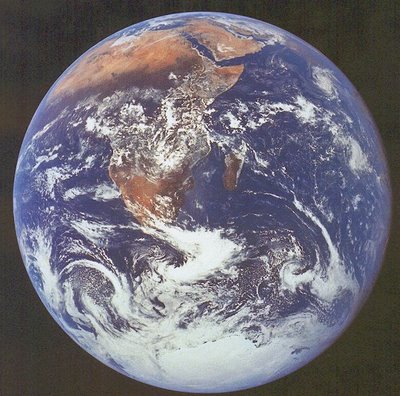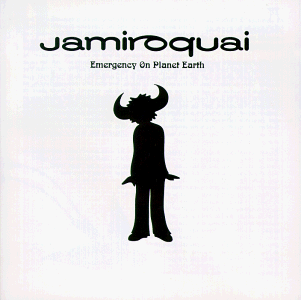
At last, there seems to be a consensus on global warming. The debate is no longer between the believers and sceptics, but between those who believe that there is still time to act and those who are convinced that we're buggered. In all of this not one person has mentioned Jamiroquai, who warned us fourteen years ago that there was an Emergency on Planet Earth.

Why didn't we listen to him? Was it the hats, the eco-unfriendly fast cars or the assaults on journalists that undermined his credentials?
 On a serious note, does anyone remember the 1988 elections for the European Parliament when the environment was such a hot topic that the Greens beat the Liberals into 4th place? I remember lots of people wearing t-shirts with pseudo-ethnic drawings and insipid mottos like Save the Rainforest and when I started in bookselling, we had a separate section for environmental books. What happened?
On a serious note, does anyone remember the 1988 elections for the European Parliament when the environment was such a hot topic that the Greens beat the Liberals into 4th place? I remember lots of people wearing t-shirts with pseudo-ethnic drawings and insipid mottos like Save the Rainforest and when I started in bookselling, we had a separate section for environmental books. What happened?
As far as I can remember a few politicians paid lip-service to green issues whilst the collapse of the Berlin Wall and the end of apartheid convinced a lot of people that the bad days were over. I can't prove this, but I remember how the t-shirts became rarer and we ended up scrapping our Ecology sections due to a lack in demand.
I'm worried that this is going to happen again.
(Warning: soapbox alert!)
If we're going to survive the challenges that lie ahead we need to take radical action now. First and foremost we need to address the issue of overpopulation before nature decides to do it for us. Second, we need to create a new infrastructure for transport, power generation and public utilities that will be carbon neutral and able to withstand extreme weather conditions. Third, we need to develop a sense of shared responsibility both on a local and global level. It is not enough to expect Brazil to unilaterally halt deforestation without our help in providing the economic support for those people who will be deprived of an income as a result
There is no reason why we all have to don hair shirts and lead utterly miserble lives to achieve this. Technology has already come up with many solutions: business trips can be replaced by video-conferencing, hydrogen fuel cells can replace petrol and solar panels will soon be efficient enough to give most homes the ability to generate some of their own power. Even the thorny issue of population can be tackled painlessly, in this country at least, if we give tax incentives for small families and rely on the increasing number of childless households to encourage negative population growth.
The answers are all there. I'm just worried that our politicians will make a few token gestures that will appease the public to the point where the big issues disappear from the agenda. It happened nearly twenty years ago and there's no reason why it couldn't again. However, perhaps the environment will remain in the forefront of people's minds for one good reason: the weather has changed.
Today I went for a walk in the countryside and saw wild flowers, two bumblebees and some daffodils almost in flower. It was lovely, but very strange. Meanwhile my fireplace remains full of unburned logs, as it has never been cold enough to have to light a fire. As I wheeled my 15-months-old son in his pushchair this afternoon, I couldn't help wondering what sort of a future he is going to have.
 On a serious note, does anyone remember the 1988 elections for the European Parliament when the environment was such a hot topic that the Greens beat the Liberals into 4th place? I remember lots of people wearing t-shirts with pseudo-ethnic drawings and insipid mottos like Save the Rainforest and when I started in bookselling, we had a separate section for environmental books. What happened?
On a serious note, does anyone remember the 1988 elections for the European Parliament when the environment was such a hot topic that the Greens beat the Liberals into 4th place? I remember lots of people wearing t-shirts with pseudo-ethnic drawings and insipid mottos like Save the Rainforest and when I started in bookselling, we had a separate section for environmental books. What happened?As far as I can remember a few politicians paid lip-service to green issues whilst the collapse of the Berlin Wall and the end of apartheid convinced a lot of people that the bad days were over. I can't prove this, but I remember how the t-shirts became rarer and we ended up scrapping our Ecology sections due to a lack in demand.
I'm worried that this is going to happen again.
(Warning: soapbox alert!)
If we're going to survive the challenges that lie ahead we need to take radical action now. First and foremost we need to address the issue of overpopulation before nature decides to do it for us. Second, we need to create a new infrastructure for transport, power generation and public utilities that will be carbon neutral and able to withstand extreme weather conditions. Third, we need to develop a sense of shared responsibility both on a local and global level. It is not enough to expect Brazil to unilaterally halt deforestation without our help in providing the economic support for those people who will be deprived of an income as a result
There is no reason why we all have to don hair shirts and lead utterly miserble lives to achieve this. Technology has already come up with many solutions: business trips can be replaced by video-conferencing, hydrogen fuel cells can replace petrol and solar panels will soon be efficient enough to give most homes the ability to generate some of their own power. Even the thorny issue of population can be tackled painlessly, in this country at least, if we give tax incentives for small families and rely on the increasing number of childless households to encourage negative population growth.
The answers are all there. I'm just worried that our politicians will make a few token gestures that will appease the public to the point where the big issues disappear from the agenda. It happened nearly twenty years ago and there's no reason why it couldn't again. However, perhaps the environment will remain in the forefront of people's minds for one good reason: the weather has changed.
Today I went for a walk in the countryside and saw wild flowers, two bumblebees and some daffodils almost in flower. It was lovely, but very strange. Meanwhile my fireplace remains full of unburned logs, as it has never been cold enough to have to light a fire. As I wheeled my 15-months-old son in his pushchair this afternoon, I couldn't help wondering what sort of a future he is going to have.

3 comments:
bbc.co.uk/sn/hottopics/climatechange/climate_challenge/index_1.shtml
have you tried this yet?
You can also get to it through Climateprediction.net
1987 general election was the first one I could vote in and I remember the Green Party being a serious candidate then, too.
"When will there be a harvest for the world?" Isley Bros! Maybe there should have a pop cabinet with manifestos comprised only of lyrics and catchy tunes and prime minister's question time a la Buffy the Musical?
Yes the Isley Bros were way ahead of Live Aid and they also anticipated climate change with 'Summer Breeze'.
Where are they now when we need them?
Perhaps the problem the Green Party had was it's perceived lack of policies on non-environmental issues.
Either way, it's unlikely that the Global Warming issue will fall off the agenda, if only because increasingly we are going to see more Hurricane Katrina events, more flooding, more famine and more extreme weather. The task that faces us all is to demand lasting political and economic change, not to allow the politicians to simplify the issue and say that it's just what we do that matter. I'll turn off the TV standby at night, but I really want them to invest millions in renewable energies. That's where our political power as voters, campaigners and activists must come to bear.
Post a Comment